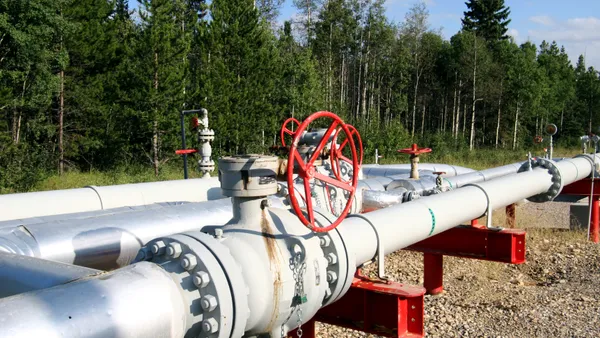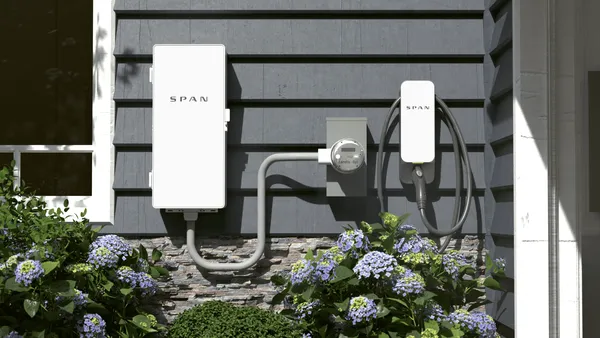UPDATE: April 14, 2020: U.S. Bankruptcy Judge Dennis Montali approved PG&E’s deal with the Butte County District Attorney, which included a $4 million fine, at a hearing Tuesday. However, Montali required PG&E to pay the fine directly to the county, rather than routing it through a separate fund earmarked to compensate victims of the wildfires, as PG&E had initially planned.
PG&E did not want to pay the fine directly since it could threaten its equity backstop financing commitments for exiting bankruptcy, attorney Stephen Karotkin said during the hearing, adding that “there was no sinister motive." However, the utility agreed to comply if Montali approved that payment method and no other stakeholders had any objections, he said.
Dive Brief:
- The judge overseeing Pacific Gas & Electric's (PG&E) bankruptcy case on Friday tentatively approved an agreement between the utility and the district attorney of California's Butte County, under which PG&E agreed to plead guilty to 84 counts of involuntary manslaughter and pay a $4 million fine related to the 2018 Camp Fire.
- But U.S. Bankruptcy Judge Dennis Montali also asked the utility to remove language from a previous filing that indicated it would route the money for the fine through a trust set up to compensate victims of the Northern California wildfires, noting in his order that "telling fire victims that their money will be used to pay criminal fines and penalties does not look right." A hearing on the motion is scheduled for Tuesday.
- Montali's order could reflect the practical observation that fire victims — who are creditors in PG&E's bankruptcy — may not vote for the company's reorganization plan if the deal doesn't look right, Steven Weissman, a lecturer at the University of California, Berkeley's Goldman School of Public Policy and former California Public Utilities Commission administrative law judge, told Utility Dive. "That undermines trust in the company, raises the suggestion that maybe PG&E still doesn't get it," he said.
Dive Insight:
The Camp Fire began in Butte County in November, 2018, killing more than 80 people and burning over 150,000 acres of Northern California. State investigators and PG&E both identified one of the utility's transmission lines as the origin of the fire, and the district attorney of Butte County later launched a criminal investigation into the blaze.
The guilty pleas to involuntary manslaughter and the fine are part of a deal to resolve that investigation. In a motion filed with the bankruptcy court in March, PG&E said that claims for restitution associated with the Camp Fire technically comprise "fire victim claims", and would be drawn from the $13.5 billion trust set up to compensate the victims of the fires.
However, that payment would not reduce the pot of money available to the victims, PG&E said in a press release issued March 30 — the $4 million would instead be added to the trust from income earned off separate payments made to a group of insurance companies who filed wildfire-related claims against the utility.
The utility's request drew ire from the tort claimants committee, a group representing the interest of all the victims of the wildfires in its reorganization process.
PG&E's apparent position that any criminal fines and penalties should be paid through the fire victim's trust would mean that "survivors and heirs of the 84 people killed by PG&E in the Camp Fire, as well as the tens of thousands of victims who lost their homes as a result of the fire started by PG&E, would end up paying for PG&E's criminal fines, penalties and investigation costs for killing their loved ones and burning their homes," the committee said in an objection filed last week.
PG&E's assertion that the money would not reduce the pot available to the victims does not resolve its concerns, the committee said, because even routing the money through the trust could establish a precedent of paying out criminal fines from it.
But Montali "has no intention of allowing any criminal fines or penalties to be paid out of the funds intended for fire victims, or from [the trust], directly or indirectly," he wrote in his tentative order. He also declined to endorse the back-and-forth over whether these penalties could be categorized as "fire claimants."
However, he raised concerns about the optics of PG&E's plan. "Some things not only have to be right, but they have to look right," Montali wrote.
While he tentatively approved the utility's motion, he instructed PG&E to remove from one of its filings language that indicated the $4 million would be paid via the fire victim's trust.
PG&E intends to provide the necessary context to Montali during the hearing Tuesday, utility spokesperson Lynsey Paulo told Utility Dive in an email.
A $4 million fine means nothing to PG&E — but the criminal convictions could end up having a much more significant impact on the utility, Weissman said. PG&E has repeatedly pushed back against California's policy of inverse condemnation, under which the utility can be held liable for fires caused by its equipment even if it is not technically negligent.
The "inverse condemnation" argument pushed the state legislature into passing a series of protections for utilities in 2018, according to Weissman, including the creation of a new wildfire insurance fund.
However, pleading guilty to 84 counts of involuntary manslaughter is an indication that the utility might have been found negligent in the first place, he said.
"Those convictions undermine PG&E's claim that it's just a victim of an unfair application of inverse condemnation," he said, adding that the convictions would also likely affect the impression of PG&E with legislators and governors going forward.














